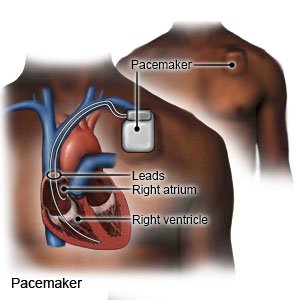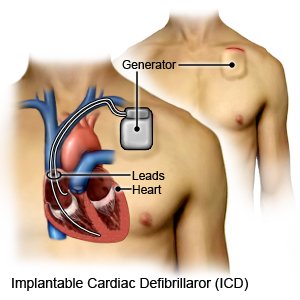Adult Congenital Heart Disease
Medically reviewed by Drugs.com. Last updated on Jul 7, 2024.
Adult congenital heart disease (ACHD) is a term used to describe defects in the structure of the heart. It may also be called congenital heart defect. Congenital means you were born with the heart defect. The defect may include a hole in part of the heart or narrowing of arteries connected to the heart. Blood may not be able to flow to or flow through your heart correctly. The defect may be mild or severe. You might be having symptoms for the first time as an adult. You might be having symptoms even if you had a heart defect repaired as a child. A congenital heart defect should be monitored regularly, even if you do not have problems.
 |
WHILE YOU ARE HERE:
Informed consent
is a legal document that explains the tests, treatments, or procedures that you may need. Informed consent means you understand what will be done and can make decisions about what you want. You give your permission when you sign the consent form. You can have someone sign this form for you if you are not able to sign it. You have the right to understand your medical care in words you know. Before you sign the consent form, understand the risks and benefits of what will be done. Make sure all your questions are answered.
Medicines:
- Heart medicines may be used to help your heart beat more regularly.
- Blood thinners may be given to prevent blood clots. This medicine increases your risk for bleeding and bruising.
- Diuretics may be given to help get rid of extra fluid in your body. This medicine may make you urinate more often.
Tests:
- Blood tests measure the amount of oxygen in your blood. A heart defect can lower your blood oxygen level.
- Echocardiography uses sound waves to form pictures of blood flow through the arteries of the heart. The pictures show all 4 heart chambers, including valves, the lining, and the aorta. Doppler is used to measure how fast blood flows through the arteries. This test is called TTE if the sensor is placed on your chest or abdomen. It is called TEE if the sensor is placed down into your esophagus.
- X-ray, CT, or MRI pictures may show the size, shape, and function of your heart. You may be given contrast liquid to help your heart show up better in the pictures. Tell the healthcare provider if you have ever had an allergic reaction to contrast liquid. Do not enter the MRI room with anything metal. Metal can cause serious injury. Tell the healthcare provider if you have any metal in or on your body.
- A heart catheterization is a procedure that helps diagnose and treat some heart problems. Healthcare providers can measure oxygen levels and pressures in your heart. They can also fix problems with your valves, blood vessels, or the walls of your heart during the procedure. A catheter is threaded into your heart through a blood vessel in your arm, leg, or neck. Contrast liquid is injected into an artery. Then x-rays of your blood flow are taken. Tell the healthcare provider if you have ever had an allergic reaction to contrast liquid.
- An exercise stress test shows if your heart gets enough oxygen and blood flow while you exercise. You will be asked to walk on a treadmill. The speed of the treadmill will be increased slowly. You will also be hooked to an ECG machine. Healthcare providers will monitor your heart rate during the test.
A pulse oximeter
is a device that measures the amount of oxygen in your blood. A cord with a clip or sticky strip is placed on your foot, toe, hand, finger, or earlobe. The other end of the cord is hooked to a machine. Never turn the pulse oximeter or alarm off. An alarm will sound if your oxygen level is low or cannot be read.
Treatment:
- An implantable device can help your heart beat normally. A pacemaker can control your heartbeat. An implantable cardioverter-defibrillator (ICD) can make your heart beat in a regular rhythm.


- A catheter procedure may be used to repair a defect. You might have had a defect repaired when you were a child, and it might need to be repaired again. A catheter is a long, thin tube. Your healthcare provider will move the catheter through a vein or artery until it is near the defect. To widen a narrowed area, he or she may inflate a small balloon device attached to the catheter. This will widen a narrowed valve in the heart.
- Open heart surgery may be needed to repair the defect if a catheter procedure cannot be done. You may need surgery to have a heart valve repaired or replaced. Surgery can also help repair problems in blood vessels that did not form correctly. A heart transplant may be needed if the defect is severe and other treatments do not work. You may need more surgery over time.
RISKS:
Your risk for an abnormal heart rhythm is increased. You may develop endocarditis (infection in the lining of the heart) or heart failure. You may also develop pulmonary hypertension or have heart valve problems. Your risk for stroke is increased if blood cannot flow correctly to your brain.
CARE AGREEMENT:
You have the right to help plan your care. Learn about your health condition and how it may be treated. Discuss treatment options with your healthcare providers to decide what care you want to receive. You always have the right to refuse treatment.© Copyright Merative 2024 Information is for End User's use only and may not be sold, redistributed or otherwise used for commercial purposes.
The above information is an educational aid only. It is not intended as medical advice for individual conditions or treatments. Talk to your doctor, nurse or pharmacist before following any medical regimen to see if it is safe and effective for you.
Learn more about Adult Congenital Heart Disease
- Atorvastatin (Lipitor): Top 12 Drug Facts You Need to Know
- Do blood pressure drugs interact with alcohol?
Treatment options
Care guides
Medicine.com guides (external)
Further information
Always consult your healthcare provider to ensure the information displayed on this page applies to your personal circumstances.
